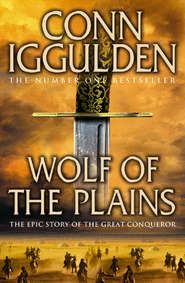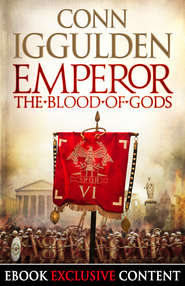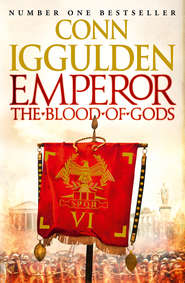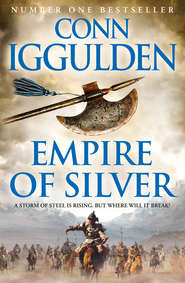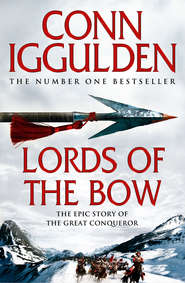По всем вопросам обращайтесь на: info@litportal.ru
(©) 2003-2024.
✖
Conqueror
Автор
Год написания книги
2019
Настройки чтения
Размер шрифта
Высота строк
Поля
Mongke turned to him, anger flushing his skin. ‘The responsibility is mine,’ he snapped.
Ilugei bowed his head rather than meet those eyes. He saw the sword shift in Mongke’s hand and straightened, stepping closer with no sign of fear.
‘Will you take my head as well? My lord, you must put aside your anger. Choosing death is not possible for you, not today. The army has only you to lead them. We are far from home, my lord. If you fall, who will lead us? Where will we go? Onwards? To challenge a grandson of Genghis? Home? You must lead us, orlok. The khan is dead, the nation is without a leader. It lies undefended, with wild dogs all around. Will there be chaos, civil war?’
Grudgingly, Mongke forced himself to think beyond the still bodies in the glade. Guyuk had not lived long enough to produce an heir. There was a wife back in Karakorum, he knew. Mongke vaguely recalled meeting the young woman, but he could not bring her name to mind. It no longer mattered, he realised. He thought of his mother, Sorhatani, and it was as if he heard her voice in his ear. Neither Batu nor Baidur had the support of the army. As orlok, Mongke was perfectly placed to take over the nation. His heart beat faster in his chest at the thought and his face flushed as if those around could hear him. He had not dreamed of it, but the reality had been thrust upon him by the bodies lying sprawled at his feet. He looked down at Guyuk’s face, so slack and pale with his blood run out of him.
‘I have been loyal,’ Mongke whispered to the corpse. He thought of Guyuk’s wild parties in the city and how they had sickened him. Knowing the man’s tastes, Mongke had never been truly comfortable with Guyuk, but all that was behind. He struggled with a vision of the future, trying to picture it. Once more, he wished Kublai were there, instead of a thousand miles away in Karakorum. Kublai would know what to do, what to say to the men.
‘I will think on it,’ Mongke said to Ilugei. ‘Have the khan’s body wrapped and made ready for travel.’ He looked at the wretched body of Guyuk’s servant, noting the slick of dry blood that had poured out of his mouth. Inspiration struck him and he spoke again.
‘The khan died bravely, fighting off his murderer. Let the men know.’
‘Shall I leave the body of the killer?’ Ilugei said, his eyes gleaming. No one loved a lie like a Mongol warrior. It might even have been true, though he wondered how Guyuk’s sword could have been cleaned and laid down so carefully by a dying man.
Mongke thought for a time, before shaking his head.
‘No. Have him quartered and the pieces thrown into one of the night pits. Let the flies and the sun feast.’
Ilugei bowed solemnly at the order. He thought he had seen the light of ambition kindle in Mongke’s eyes. He was certain the man would not turn down the right to be khan, no matter how it had come about. Ilugei had despised Guyuk and it was with relief that he thought of Mongke leading the nation. He had no time for the insidious Chin influences that had become so much a part of the nation’s culture. Mongke would rule as Genghis had, a traditional Mongol khan. Ilugei struggled not to smile, though his heart rejoiced.
‘Your will, my lord,’ he said, his voice steady.
CHAPTER TEN
It took a month to bring the army home to Karakorum, almost half the time it had taken to ride out. Freed of Guyuk’s command, Mongke had the men up before dawn each morning, moving on at a hard pace and begrudging every stop to snatch food or sleep.
When they sighted the pale city walls, the mood amongst the men was hard to define. They carried the body of the khan and there were many who felt the shame of failing in their duties to Guyuk. Yet Mongke rode tall, already certain in his authority. Guyuk had not been a popular khan. Many of the warriors took their manner from Mongke and did not hang their heads.
The news had gone before them, by way of the yam riders. As a result, Sorhatani had been given time to prepare the city for days of mourning. Braziers filled with chips of cedar and black aloes wood had been set alight that dawn, with the approach of the army. A grey smoke rose into the air across Karakorum, wreathing the city in mist and rich scents. For once, the stink of blocked sewers was masked.
With Day Guards in their best armour, Sorhatani waited by the city gate, looking out over the road to her son’s army coming home. Kublai had barely made it back before his brother and then only by resuming his guise as a yam rider. Sorhatani felt her age as she stood in the breeze, staring at the dust raised by tens of thousands of horses and men. One of the Guards cleared his throat and then began a spasm of coughing that he could not control. Sorhatani glanced at him, her eyes warning him to be silent. Mongke was still some way off and she took a step towards the warrior, placing her hand on his forehead. It was burning and she frowned. The red-faced warrior was unable to reply to her questions. As she spoke, he raised a hand helplessly and in irritation she waved him out of line.
Sorhatani felt an itch begin in her own throat and swallowed hard to control it before she embarrassed herself. Two of her servants were in bed with the same fever, but she could not think of that now, with Mongke coming home.
Her thoughts strayed to her husband, dead so many years before. He had given his life for Ogedai Khan and he would never have dared to dream that one of his own sons would rise. Yet who else could be khan now that Guyuk was dead? Batu owed everything to her, not just his life. Kublai was certain he would not be an obstacle to her family. She sent a silent prayer to her husband’s spirit, thanking him for the original sacrifice that had made it all possible.
The army came to a halt and settled in around the city, unburdening the horses and letting them run free to crop grass that had grown lush in their absence. It would not be long before the plains of Karakorum were bare dirt again, Sorhatani thought. She watched as Mongke came riding in with his minghaan officers, wondering if she could ever tell him the part she had played in Guyuk’s death. It had not worked out as she and Kublai had planned. All she had intended was for Batu to be saved. Yet she could feel no regret for the loss of the khan. She had already seen some of his favourites reduced to trembling horror as they heard their protector had gone. It had been hard for her not to enjoy their distress, having so long endured their petty dominance. She had dismissed the guards Guyuk had set to watch her. She had no real authority to do so, but they had been able to feel the wind changing as well. They had left her apartments at undignified speed.
Mongke rode up and dismounted, embracing her with awkward formality. She noted he wore the wolf’s-head sword on his left hip, a potent symbol. She gave no sign she had seen it. Mongke was not yet khan and he had to tread a difficult path in the days ahead, until Guyuk was buried or burnt.
‘I wish I could have come back with better news, mother.’ The words still had to be said. ‘The khan has been killed by his servant, murdered while he was out hunting.’
‘It is a dark day for the nation,’ Sorhatani replied formally, bowing her head. Her chest tightened as a cough threatened and she swallowed spit in quick gulps. ‘There will have to be another quiriltai, another gathering of the princes. I will send out the yam riders to have them come to the city next spring. The nation must have a khan, my son.’
Mongke looked sharply at her. Perhaps only he could have heard the subtle emphasis of the last words, but her eyes gleamed. He nodded just a fraction in answer. Among the generals, it was already accepted that Mongke would be khan. He had only to declare himself. He took a deep breath, looking around him at the honour guard Sorhatani had assembled. When he spoke, it was with quiet certainty.
‘Not to the city, mother, not to this place of cold stone. I am the khan elect, grandson to Genghis Khan. The decision is mine. I will summon the nation to the plain of Avraga, where Genghis first gathered the nation.’
Unbidden, tears of pride came to Sorhatani’s eyes. She bowed her head, mute.
‘The nation has drifted far from the principles of my grandfather,’ Mongke said, raising his voice to carry to his officers and the Guards. ‘I will drag it back to the right path.’
He looked through the open gate to the city beyond, where tens of thousands worked to administer the empire, from the lowliest taxes to the incomes and palaces of kings. His face showed his disdain, and for the first time since she had heard of Guyuk’s death, Sorhatani felt a whisper of concern. She had thought Mongke would need her guidance as he took control of the city. Instead, he seemed to look through Karakorum to some inner vision, as if he did not see it at all.
When he spoke again, it was to confirm her fears.
‘You should retire to your rooms, mother. At least for a few days. I have brought a burning branch back to Karakorum. I will see this filthy city made clean before I am khan.’
Sorhatani fell back a step as he remounted and rode through the gate towards the palace. His men were all armed and she saw their grim faces in a new light as they followed their lord into Karakorum. She began to cough in the dust of their passing, until there were fresh tears in her eyes.
By the afternoon, the scented braziers had burnt low and the city was beginning the formal period of mourning for Guyuk Khan. His body lay in the cool basement of the palace, ready to be cleaned and dressed for his cremation pyre.
Mongke strode into the audience room through polished copper doors. The senior staff in Karakorum had gathered at his order and they knelt as he entered, touching their heads to the wooden floor. Guyuk had been comfortable with such things, but it was a mistake.
‘Get up,’ Mongke snapped as he passed them. ‘Bow if you must, but I will not suffer this Chin grovelling in my presence.’
He seated himself on Guyuk’s ornate throne with an expression of disgust. They rose hesitantly and Mongke frowned as he looked closely at them. There was not a true Mongol in the room, the legacy of Guyuk’s few years as khan as well as his father before him. What good had it done to conquer a nation if the khanate was taken over from within? Blood came first, though that simple truth had been lost to men like Guyuk and Ogedai. The men in the room ran the empire, set taxes and made themselves rich, while their conquerors still lived in simple poverty. Mongke showed his teeth at the thought, frightening them all further. His gaze fell on Yao Shu, the khan’s chancellor. Mongke studied him for a time, remembering old lessons with the Chin monk. From Yao Shu he had learned Buddhism, Arabic and Mandarin. Though Mongke disdained much of what he had been taught, he still admired the old man and Yao Shu probably was indispensable. Mongke rose from the throne and walked along their lines, marking senior men with a brief hand on their shoulders.
‘Stand by the throne,’ he told them, moving on as they scurried to obey. In the end, he chose six, then stopped at Yao Shu. The chancellor still stood straight, though he was by far the oldest man in the room. He had known Genghis in his youth and Mongke could honour him for that at least.
‘You may have these as your staff, chancellor. The rest will come from the nation, from those of Mongol blood only. Train them to take over from you. I will not have my city run by foreigners.’
Yao Shu looked ashen, but he could only bow in response.
Mongke smiled. He was wearing full armour, a signal to them that the days of silk were at an end. The nation had been raised in war, then run by Chin courtiers. It would not do. Mongke walked to one of his guards and murmured an order into his ear. The man departed at a run and the scribes and courtiers waited nervously as Mongke stood before them, still smiling slightly as he gazed out of the open window to the city beyond.
When the warrior returned, he carried a slender staff with a strip of leather at the end. Mongke took it and rolled his shoulders.
‘You have grown fat on a city that does not need you,’ he told the men, swishing the air with the whip. ‘No longer. Get out of my house.’
For an instant, the assembled men stood in shock at his words. It was all the hesitation he needed.
‘And you have grown slow under Guyuk and Ogedai. When a man, any man, of the nation gives you an order, you move!’
He brought the whip across the face of the nearest scribe, making sure that he struck with the wooden pole. The man fell backwards with a yelp and Mongke began laying about him in great sweeps. Cries of panic went up as they struggled to get away from him. Mongke grinned as he struck and struck again, sometimes drawing blood. They streamed out of the room and he pursued them in a frenzy, whipping their legs and faces, whatever he could reach.
He drove them down the cloisters and out into the marshalling yard of the palace, where the silver tree stood shining in the sun. Some of them fell and Mongke laughingly kicked them to their feet so that they stumbled on with aching ribs. He was a warrior among sheep and he used the whip to snap them back into a group as he might have herded lambs. They stumbled ahead until the city gate loomed, with Guards looking down in amusement from the towers on either side. Mongke did not pause in his efforts, though he was running with sweat. He kicked and shoved and tore at them until the last man was outside the walls. Only then did he pause, panting, with the shadow of the gate falling across him.
‘You have had enough from the nation,’ he called to them. ‘It is time to work for your food like honest men, or starve. Enter my city again and I will take your heads.’
A great wail of distress and anger went up from the group and for a moment Mongke even thought they might rush him. Many had wives and children still in the city, but he cared nothing for that. The lust to punish was strong in him and he almost wished they would dare to attack, so he could draw his sword. He did not fear scholars and scribes. They were Chin men and, for all their fury and cleverness, they could do nothing.
When the group had subsided into impotent muttering, Mongke looked up at the Guards above his head.
‘Close the gate,’ he ordered. ‘Note their faces. If you see a single one again inside the walls, you have my permission to put an arrow in them.’
He laughed then at the spite and horror he saw in the crowd of battered and bruised courtiers. Not one had the courage to challenge his orders. He waited as the gates were pushed closed, the line of sight to the plains shrinking to a crack and then nothing. Outside, they wailed and wept as Mongke nodded to the Day Guards and threw down the bloody whip at last, walking back alone to the palace. As he went, he saw thousands of Chin faces peering out from houses at the man who would be khan in spring. He grimaced, reminded once again that the city had fallen far from its origins. Well, he was no Guyuk to be baulked for years in his ambition. The nation was his.






